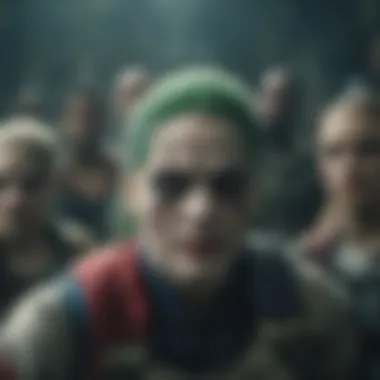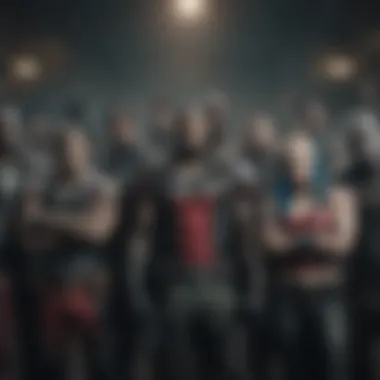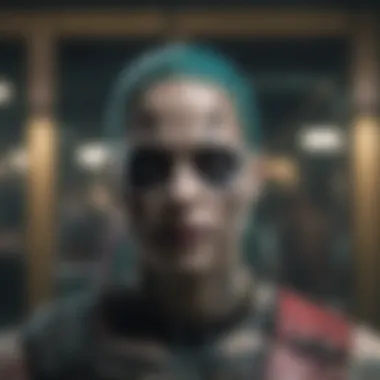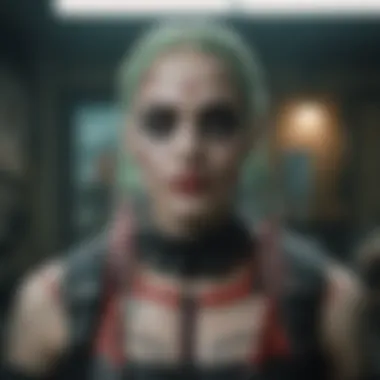Exploring HBO Max's Suicide Squad: Narrative and Impact


Intro
The HBO Max release of Suicide Squad represents a significant milestone in the ever-shifting landscape of superhero films. With audiences constantly seeking fresh narratives and deeper character explorations, this iteration of the Suicide Squad franchise promises to deliver just that. Within this piece, we’ll delve into the intricacies of its story, the evolution of its characters, and the film's broader impact on the superhero genre.
The Suicide Squad brings with it a colorful mix of antiheroes, each with their own motives and backgrounds. This character diversity not only offers a feast for comic book aficionados but also reflects a cultural shift toward embracing morally complex figures. This nuanced portrayal stands in stark contrast to the more black-and-white figures seen in previous DC film adaptations. The multi-layered aspect of the film adds depth to its narrative, elevating it above typical comic book fare.
In the following sections, we will provide a comprehensive guide—highlighting the industry's current trends, insights from behind the scenes, and critical analyses. Through careful examination, we aim to unravel how Suicide Squad contributes to contemporary pop culture and what this means for future adaptations in the genre.
Preamble to HBO Max's Suicide Squad
HBO Max's release of Suicide Squad provided a fresh lens through which audiences could engage with the familiar yet chaotic realm of DC Comics. The film represents more than just another superhero flick; it embodies a creative conversation about morality, chaos, and redemption. The dual nature of the characters—caught between villainy and heroism—mirrors society’s grappling with right and wrong. This complexity is crucial as it sets the stage for understanding how the movie seeks to deconstruct or, better yet, reconstruct commonly held perceptions about superheroes and their adversaries.
By laying out the foundation of the Suicide Squad, we can see how this narrative fits into a larger framework within the DC universe. The film serves as a catalyst, challenging viewers’ expectations and exploring deeper socio-political themes. Moreover, it connects to its predecessors and successors within the ever-evolving franchise, making it essential to analyze its various components. Understanding the film’s context not only enriches our viewing experience but also amplifies the significance of its themes.
Overview of the Film
Released on HBO Max, the Suicide Squad reinvigourated a franchise that had previously faced criticism. This installment, led by director James Gunn, is a standalone film but indirectly references the earlier adaptation—the 2016 version directed by David Ayer. The narrative follows a misfit group of anti-heroes who are coerced by the U.S. government into executing nearly impossible missions, all while grappling with their personal demons.
The plot takes viewers to Corto Maltese, an island beset by political turmoil and nefarious creatures. The Squad is tasked with infiltrating the island to destroy a secretive laboratory involved in (what else?) a bizarre experiment. While the story unfolds with lots of humor and explosive action, it also gives us glimpses into the backstories of each member, allowing for a richer character study than its predecessor.
The Evolution of the Suicide Squad Franchise
The Suicide Squad franchise has seen its share of ups and downs. Beginning as a comic book series in the 1950s, the concept evolved significantly over the decades. Originally, it showcased a more straightforward depiction of law enforcers; however, the more recent interpretations introduce morally ambiguous characters who challenge the notion of a traditional hero.
The 2016 film attempted to reintroduce these complex themes, but critical reception was lukewarm at best. It prompted a reevaluation of how stories in the superhero genre are told. With HBO Max's release, the franchise managed to pivot and take risks that resonated well with audiences. This evolution has transformed the Suicide Squad from a series about quirky villains to a highly ambitious narrative exploring themes of friendship, redemption, and self-worth.
The Creative Vision Behind the Film
The artistic direction of HBO Max's Suicide Squad plays a pivotal role in defining not only its identity but also the resonance it carries with the audience. This section scrutinizes the creative vision that propelled the film, focusing on two key aspects: the director's approach and the screenplay that lays the groundwork for character interactions and plot progression.
Director's Approach and Stylistic Choices
James Gunn, known for his unique flair, directed Suicide Squad with a blend of wit and intensity that merges various genres seamlessly. His style, often peppered with humor amidst chaotic action, invites the viewer into a world where misfits manage to be both endearing and menacing.
Gunn’s fondness for unconventional storytelling shines through. Instead of a typical hero narrative, he navigates the audience through the morally gray areas that define his characters. This complexity is highlighted through vibrant cinematography and engaging visual aesthetics. Each frame showcases colors that pop, rendering a lively backdrop against the darker themes explored.
Additionally, Gunn's decision to embrace practical effects over computer-generated imagery where it makes sense adds a layer of authenticity. It makes the violence visceral and impactful. The unpredictability of the characters and their choices is accentuated by the film's tempo, fluctuating between moments of levity and high stakes. This rhythm builds an emotional connection with the audience, inviting them to laugh, gasp, and sometimes shed a tear for these flawed characters.
Screenplay Analysis
The screenplay of Suicide Squad serves as the backbone of the film, driven by a clever mix of sharp dialogue and intricate plot points. It provides a canvas upon which Gunn paints his chaotic narrative. Each character is not merely a caricature but a reflection of deeper struggles and desires.
Characters are introduced with succinct, punchy lines that establish their personalities right from the get-go. For instance, Harley Quinn's over-the-top antics and wildly erratic dialogue engage viewers immediately, allowing them to warm up to her insanity. The screenplay crafts a world where every character's motivations are woven into the narrative, which is especially evident in scenes that allow antagonistic forces to be relatable.
Furthermore, this screenplay strays from clichéd hero-versus-villain tropes. Instead, it leans into character flaws, making them incredibly human despite their outlandish circumstances. This is seen in Peacemaker's paradoxical approach to peace, revealing the absurdity in his methods, which leads to compelling moral dilemmas.
"In a world obsessed with clear-cut definitions of good and evil, Suicide Squad dares to tread the murky waters in between."
While the film's dialogue is witty and engaging, it also bears the weight of real emotions. Moments of vulnerability, such as the reflections on family or loss, ground the film amidst its more outrageous elements. The combination of levity with seriousness invites viewers to introspect on the character’s choices, making the stakes feel real and consequential.
In summary, the creative vision articulated by the director and encapsulated in the screenplay forms the crux of Suicide Squad, showing an ambition to redefine conventional narratives within the superhero genre. The film resonates not only through its humor and action but also through an underlying complexity that challenges perceptions of morality and agency.


Character Analysis
Analyzing character portrayals within HBO Max's Suicide Squad plays a crucial role in understanding not just the film's narrative, but also its overall cultural significance. Characters in this movie are more than just tools of action; they bring forth themes of redemption, moral ambiguity, and the complexities of human nature. Engaging deeply in this character analysis helps to reflect on how these individuals contribute to larger discussions in the superhero genre and society at large. Different characters embody various facets of morality and humanity, thus presenting a multidimensional experience for viewers, one that highlights the thin line between good and evil.
Key Characters and Their Arcs
The cast of characters featured in Suicide Squad offers a blend of personalities, each with distinct narratives that intertwine throughout the film. Central to the story is Harley Quinn. Her arc, moving from a chaotic, impulsive anti-heroine to someone seeking genuine connection, showcases a broad swath of emotional depth. Unlike traditional portrayals of female characters in superhero films, Harley is not mere eye candy; she embodies strength and vulnerability simultaneously.
Another pivotal character is Bloodsport, whose initial aloofness gradually melts away to reveal a deep-rooted desire for acceptance and paternal values. As he forms unexpected bonds with his squad mates, Bloodsport's journey illustrates themes of growth and teamwork.
The character Peacemaker, played by John Cena, stands out as well. He presents a paradoxical view of heroism, insisting that his overly violent approach to achieving peace is for a greater good. This complicates the viewer's perception of what actually defines a hero. Additionally, characters like King Shark and Captain Boomerang further the narrative by infusing their comedic quirks, but these traits also serve to underscore darker elements of the story.
In contrast, characters like Rick Flag represent more grounded ideals. His struggle to maintain a balance between ambition and morality poses questions about duty and what it means to fight for the right reasons.
Villains, Anti-Heroes, and Their Representations
The film does not merely float heroes on a pedestal; villains, particularly Enchantress, complicate the narrative, presenting characters who, driven by their dark motives, force the squad to grapple with their own inner demons. The representation of villains as deeply flawed beings dimly echoes real-world complexities, provoking contemplation of whether individuals can change or be redeemed post their villainous acts.
The anti-heroes of Suicide Squad serve to challenge typical narratives around heroism. Unconventional choices around character development reveal that flaws and bad decisions can lead to shared growth. This lens reinforces a significant argument: heroes are not defined by a clean slate, making their journeys resonate more profoundly with the audience.
Female Characters: Agency and Representation
Female representation in Suicide Squad invites a conversation about agency. Harley Quinn's character arc alone exhibits a journey from dependence to autonomy. Though originally painted as Joker's sidekick, she evolves into a strong, independent figure—removing herself from the shadows of her male counterpart.
Moreover, characters like Amanda Waller, driven and ruthless, break free of stereotypes associated with traditional female roles in action films. Waller's authoritative presence not only showcases women's capability in leadership but also navigates the moral grey areas often reserved for male characters.
"In a universe dominated by male narratives, these strong female characters pave the way for more authentic portrayals in the superhero genre."
Evaluating these characters invites viewers to question prevailing perceptions of women—showcasing that they can be as fierce, flawed, and complex as their male counterparts. In this analysis, we observe how the film invokes a necessary re-evaluation of narratives around gender while intertwining thrilling entertainment with significant observations about societal roles.
Analyzing the character landscapes within Suicide Squad offers uncharted depth, introducing layers that challenge norms and provoke thought. This narrative complexity ultimately enhances the viewer's experience and provides a benchmark for future character-driven adaptations.
Thematic Explorations
The thematic explorations within HBO Max's Suicide Squad serve as a vital lens through which the film can be understood. As we pull apart the narrative layers, we find that themes play a crucial role not only in the individual characterization but also in connecting the viewers to the broader societal concepts at play. Through chaos, friendship, betrayal, redemption, and sacrifice, the film uses its ensemble cast to navigate and illustrate deeper moral questions. In many ways, it is these thematic elements that elevate the narrative beyond mere entertainment, prompting the audience to reflect on the very nature of morality in a chaotic world, and to consider the bonds that tie individuals together, even amidst strife.
Morality in Chaos: A Central Theme
The theme of morality amid chaos is perhaps the backbone of Suicide Squad, cleverly intertwined throughout the plot. The film presents a view where right and wrong aren't always black and white. As viewers follow the ragtag group of anti-heroes, they witness each character grappling with their own version of morality, which is often influenced by their past and the dire situations they find themselves in.
- The characters depict how personal circumstances shape moral choices. For instance, Harley Quinn operates outside the bounds of societal norms due to her toxic relationship with the Joker. This complexity prompts viewers to ask themselves: Can one redeem themselves through chaos, or does chaos merely amplify one's flaws?
- Moreover, the narrative challenges viewers to consider the impact of their choices. It spotlights characters like Bloodsport and Peacemaker, who are pitted against each other yet embody different philosophies. Bloodsport’s character wrestles with the consequences of violence in a world that often glorifies it.
The chaos here serves not just as a backdrop for action, but as a catalyst for revealing the characters' deeper selves. In essence, this theme teaches about the fragility of human morality when pitted against survival, illustrating how individuals can act both altruistically and selfishly in moments of strife.
Friendship and Betrayal within the Squad
Another significant theme is the complex relationships of friendship and betrayal within the group. Suicide Squad plays with these dynamics, showcasing how shared experiences, however tumultuous, can foster surprising bonds among individuals with seemingly little in common.
- The relationships formed in chaotic environments often serve as a reflection of the human condition. For instance, the bond between Harley Quinn and the others evolves through the shared experience of fighting for survival. Despite initial skepticism towards one another, they develop a form of camaraderie, which highlights a critical element of why squads and teamwork matter.
- However, the specter of betrayal lingers throughout. Characters like Amanda Waller embody the ruthless organizational strategies that lead to backstabbing moments, reminding viewers that trust is a scarce commodity in their world. Such betrayals not only create tension but drive the narrative, demonstrating how alliances can shift dramatically in the face of adversity.
This interplay pushes the audience to consider the significance of loyalty in relationships forged under duress and what betrayal means when your allies are also facing their demons.
Redemption and Sacrifice: A Deeper Look


Redemption and sacrifice emerge as significantly layered themes in Suicide Squad, inviting reflection on the transformative aspects of self-sacrifice for a greater good. Characters are often seen at crossroads, making pivotal decisions that reflect their growth or, in some cases, their moral decline.
- For example, characters like Rick Flag and Ratcatcher 2 showcase personal growth through acts of selflessness. Their choices raise the stakes dramatically, serving as turning points that allow for a deeper understanding of sacrifice. The film conveys that redemption is attainable, but often involves putting oneself at risk for others, and that the road to redemption is laden with obstacles.
- Contrastingly, certain characters struggle with their redemption arcs, highlighting the concept that not every journey leads to a heroic outcome. This complexity enriches the narrative, as seen through the character of Bloodsport, who grapples with his motivations and choices during the crux of the team's mission.
In exploring these themes, Suicide Squad encourages viewers to reflect not only on the quest for redemption but also on the essence of sacrifice—what are we willing to give up for others, and how does that shape our identities?
Ultimately, these thematic explorations provide a comprehensive understanding of the Suicide Squad experience, linking character arcs to broader moral questions, the nuances of human relationships, and the profound impact of choice in the chaotic world they inhabit.
"In a world where chaos reigns, even the darkest hearts yearn for connection and sacrifice."
Production and Special Effects
Production and special effects play a crucial role in the overall appeal and effectiveness of any film, particularly in the realm of superhero adaptations like HBO Max's Suicide Squad. Given the film’s vibrant themes and outlandish characters, the production decisions and visual artistry become entwined with narrative, often elevating the storytelling to another level. Through careful selection of filming locations, set design, and technical innovations, the film harnesses a unique atmosphere that aligns perfectly with its chaotic narrative.
One cannot underestimate the synergy between production quality and audience immersion, especially in a film that wrestles with themes of chaos and redemption throughout its arcs. This section aims to peel back the layers of both set design and visual effects, essential components that determine how the viewer perceives and feels about this distinctive ensemble of antiheroes.
Filming Locations and Set Design
Suicide Squad effectively uses various filming locations that capture the gritty essence of its narrative. The locations reflect the film’s core themes, acting almost as characters in their own right. For instance, the choice to film in locales such as Panama City provides a vibrant yet raw backdrop that showcases the chaotic urban landscape fittingly.
Set design further magnifies this effect. The clash of bright colors and dark themes resonates deeply. Massive sets resembling twisted urban decay contrast sharply with the outrageous costumes of the characters, marrying playfulness with peril. It’s important to note that a film like this thrives on the tension created by its environments, where each location fuses seamlessly with the story.
- Key elements of set design include:
- Authenticity: Real-world locations lend a sense of realism to a fantastical plot.
- Symbolism: Locations are artfully chosen to signify the turmoil within the characters' arcs.
- Spatial Dynamics: Spatial arrangements amplify feelings of chaos or camaraderie amongst characters.
Through the director's keen eye and the production team's meticulous planning, the visuals tell stories that words simply cannot capture.
Visual Effects and Their Contribution
The visual effects in Suicide Squad bring the bizarre world of DC Comics vividly to life. When characters like Harley Quinn and King Shark leap from the pages into live-action, the line between reality and surrealism blurs. Masterful implementation of visual effects creates that essential escape into caricature without losing the weight of genuine emotion beneath the surface.
"Visual effects are not just for spectacle; they should serve the narrative and evoke real feelings from the audience."
For example, the explosion sequences and vibrant powers displayed by the characters are carefully crafted not only to dazzle but to reinforce character traits and motivations. The digital enhancements allow for both chaos and creativity, ensuring that each frame enhances the world-building necessary for such ludicrously larger-than-life characters.
- Benefits of high-quality visual effects include:
- Engagement: Keeps viewers invested through stunning visuals that engage the senses.
- Character Experience: The effects offer a deeper insight into a character's powers, providing a glimpse into their psyche.
- Narrative Support: They can highlight or underscore themes within the film, making moments more poignant.
In summary, production and special effects not only ensure the film's aesthetic appeal but also undergird its narrative intentions. Each set and digital effect serve as active contributors to the film's unique storytelling, enhancing its chaotic yet meaningful exploration of antiheroes navigating a tumultuous world.
Audience Reception and Critical Perspective
Understanding the audience reception and critical perspective surrounding HBO Max’s Suicide Squad is integral for grasping its cultural significance. The way a film is received by both viewers and critics can provide insights into its thematic resonance, narrative effectiveness, and overall contribution to the superhero genre. In the case of Suicide Squad, this reception not only reflects the varying tastes of audiences but also showcases how the film’s unique elements, characterizations, and humor were perceived in a market saturated with superhero content. In addition, examining box office performance and viewer ratings illuminates the film's commercial viability and shaping of public expectation regarding future DC adaptations.
Box Office Performance and Viewer Ratings
Box office figures paint a clear picture of a film’s market impact, acting as a revealing barometer for both its popularity and reception. With a production budget of approximately $185 million, the HBO Max Suicide Squad aimed to make a significant statement in a crowded marketplace. Upon its release, the film generated about $167 million domestically—numbers that initially appear less than stellar against its budget. However, when taken alongside the challenges posed by the pandemic, particularly with simultaneous streaming and theater release, these figures tell a different story.
In the realm of viewer ratings, Suicide Squad saw a range of reactions across platforms:


- Rotten Tomatoes: The film garnered a % audience score that reflected a polarized response. Some fans praised its bold choices and character depth, while others felt it didn't hit the mark.
- Metacritic: The critical reviews created a mixed bag, a blend of admiration and criticism that showcased its inventive approach compared to past entries in the franchise.
- IMDb: With a viewer score hovering around %, audiences shared a more favorable nod to its comic flair and irreverent tone, which deviated from traditional superhero norms.
"Sometimes, a movie is the popcorn delight you didn’t know you needed, but every kernel may not suit every taste."
Critical Responses and Reviews
Critical responses to Suicide Squad have been as colorful as the film’s aesthetic style. Critics found themselves divided on various aspects of the film, from the screenplay's tonal shifts to the robustness of character development. Major film critics from well-known outlets often highlighted the film’s attempt to engage with darker narratives while also creating a comedic undertone that felt fresh.
Some notable criticisms included:
- Character Development: Many reviewers pointed out that while certain characters shone brightly, others felt sidelined, which may leave audiences wanting more depth overall.
- Pacing Issues: Several critiques commented on the film's pacing, noting that the rapid-fire shifts in tone could disrupt the viewer's emotional journey.
- Visual Style: Conversely, many accepted the film’s vibrant visual style and off-kilter humor, praising it for breaking away from the typical superhero mold.
Ultimately, this mix of dissatisfaction and acclaim reflects the complexities of adapting source material that’s so diverse in its interpretation within comics as a whole. The dialogue surrounding these responses provides a new lens through which to explore the evolving superhero genre, helping to lay the groundwork for what audiences might expect from upcoming adaptations.
Through these lenses, Suicide Squad illustrates the multifaceted interactions between creators and their audience, showcasing how movies can spark divergent views while still capturing the imagination of many.
Cultural Impact and Legacy
The significance of exploring the cultural impact and legacy of HBO Max's Suicide Squad cannot be overstated. This film didn't just shake up the comic book adaptation landscape; it also prompted discussions that reverberate through the superhero genre. The themes, characters, and creative decisions within this movie influenced both audiences and future productions in ways that are still unfolding.
Influence on Future Adaptations
One potent byproduct of Suicide Squad’s unique narrative approach is its role in shaping future DC adaptations. The success of embracing a more irreverent tone and complex characters has, arguably, encouraged a wave of storytelling that takes risks. Previous DC films often clung to darker and more serious narratives, perhaps overestimating audiences' thirst for grim themes.
However, Suicide Squad struck a chord with viewers yearning for something new. This pressure for creative freshness appeared in various roles in films that followed, such as The Batman and The Flash. The balance of humor and serious undertones seen in Suicide Squad has become a template for these newer projects, allowing for a broader range of character narratives and audience engagement, which ultimately leads to a richer cinematic experience.
Additionally, the exploration of anti-heroes and morally ambiguous characters took center stage post-release. Viewers began to realize that not all heroes fit neatly into predefined boxes. Such portrayals challenge traditional heroism and prompt reflection on the nature of good and evil. Films that highlight gray morality have gained traction, which can be traced back to the influence of this adaptation.
Re-evaluating the Superhero Genre Post-Release
Upon its release, Suicide Squad contributed to a significant re-evaluation of the superhero genre itself. Traditionally characterized by clear-cut heroes and villains, the film introduced a more nuanced perspective that resonated deeply with audiences. Characters like Harley Quinn and Deadshot, among others, became emblematic of a shift toward the complex, flawed individual rather than the archetypal hero.
This transformation encouraged fans to engage with superheroes on different levels. Rather than merely rooting for the good guys, audiences began to find themselves immersed in more layered storytelling, where their allegiance could shift and where themes of personal struggle and redemption flourished.
Moreover, Suicide Squad highlighted the importance of representation within the genre. It brought diverse characters to the forefront, promoting visibility that resonates with wider audiences. The portrayal of various backgrounds allows viewers from different walks of life to see themselves reflected on screen, stirring deeper connections with the material.
"The Suicide Squad holds a mirror to its audience, challenging us to reckon with our values and assumptions about heroism, leaving an indelible mark on the superhero narrative."
As the landscape of superhero narratives continues to evolve, it's clear that HBO Max's Suicide Squad plays a pivotal role in that transformation, encouraging both creators and audiences to look beyond the cape and the mask. This shift invites richer storytelling possibilities, thereby solidifying the film’s legacy long after its credits roll.
Culmination
The final contemplation of HBO Max's Suicide Squad encapsulates a multifaceted exploration of its narrative, themes, and characters, tying together key insights that arise throughout the film's analysis. It is essential to underscore the role this film plays not only within the DC Universe but also in the larger discussion surrounding superhero and comic book adaptations. Amidst a sea of characters often painted with broad strokes, Suicide Squad carves out a unique space through its blend of chaos and camaraderie, presenting anti-heroes that resonate on a human level.
Summation of Key Insights
The film's strength lies in its character-driven approach, where each member of the Squad grapples with deeply personal issues while being thrust into extraordinary circumstances. The thematic elements of friendship, betrayal, and moral ambiguity serve as the backbone of the story, exposing the complexities of human relationships even in a world dominated by destruction and violence.
- Character Depth: Each character's journey is woven intricately into the overarching narrative, allowing for moments of vulnerability that elevate their role from mere plot devices to relatable figures.
- Cultural Commentary: The Suicide Squad not only entertains but also sparks conversation regarding morality and redemption, asking viewers to reconsider what it means to be a hero or a villain.
- Impact on Genre: By challenging traditional tropes associated with superhero narratives, the film lays groundwork for a potential shift in how future DC adaptations might approach their storytelling.
"Suicide Squad highlights that heroes can come from the most unexpected places, and perhaps, so can change."
The Path Forward for Films
Looking ahead, the path for DC films seems promising yet riddled with challenges. Suicide Squad serves as a clarion call for the franchise to embrace more nuanced storytelling and robust character development. A few considerations for the future include:
- Diverse Narratives: Capitalizing on the diverse background of characters can deepen the storytelling experience, drawing a broader audience.
- Exploration of Anti-Heroes: Future installments could further explore the anti-hero trope, providing audiences with narratives that confront conventional definitions of good and evil.
- Fan Engagement: Establishing a two-way relationship with fans, akin to what Suicide Squad achieved, could foster a more invested fanbase and enhance cinematic experiences.
In summary, while Suicide Squad wraps up its narrative in a colorful, chaotic bow, its legacy is just beginning. For DC, embracing the lessons gleaned from this chaotic ensemble film might open doors to fresh storytelling approaches that resonate with audiences, both new and old.



